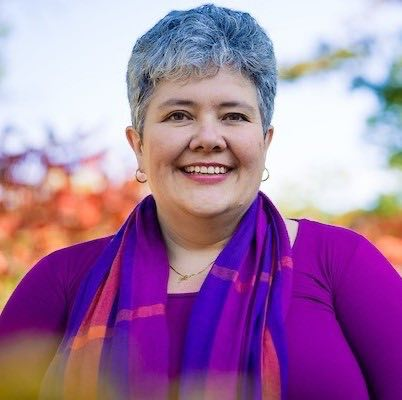From rising costs to rising sea levels, environmental degradation to overdose deaths, from the numbers of displaced people worldwide to those facing homelessness here at home, the crises of our time continue to grow. It’s all too easy to fall into despair or demonization of those who are at the heart of these crises. In the face of widespread challenges, the predominant culture preaches a gospel of personal resilience, as if individual acts of self-care are a sufficient response to complex societal, even global, problems.
We are created as interdependent beings, connected, as Scripture tells us, like the many members of one body. The challenges we face are not to be shouldered alone, but together. “Bear one another’s burdens, and in this way you will fulfill the law of Christ.” (Gal. 6:2) In supporting each other, and especially the most vulnerable members of our communities, we resist the prevailing (and isolating) message of hyper-individualism and are better able to persevere in adversity.
This year’s diocesan Outreach & Advocacy Conference, to be held online on Oct. 26, focuses on “Communities of Resilience and Resistance.” What can we learn from communities that have experienced years, even decades, of supporting each other in the face of overwhelming trials? And how can we come alongside to support them in turn?
This year’s keynote speaker is Chief Rudy Turtle of Grassy Narrows First Nation, a northern Ontario community that has demonstrated incredible resilience and resistance in the face of calamity. From 1962 to1970, more than 10 tonnes of mercury from the Dryden pulp and paper mill 100 kilometres upstream was dumped into the Wabigoon river system, poisoning the water, fish and wild rice on which members of Grassy Narrows depend. Generations of community members have experienced the physical and psychological effects of mercury poisoning and the economic impacts of losing their commercial fishery and fishing tourism industry. Moreover, rather than diminishing over time, the existing mercury levels have been exacerbated by ongoing industrial and forestry activities.
In response, the community has come together to resist the exploitation of its natural resources and demand justice. A founding member of the First Nations Land Defence Alliance, Grassy Narrows is home to the longest running First Nation logging blockade in Canadian history, which started in December 2002. Members of the community have repeatedly travelled to Toronto and Ottawa to demand justice, most recently in September of this year. This spring, after a scientific study confirmed that mercury levels were being made worse by continued industrial pollution, Grassy Narrows launched a lawsuit against the federal and provincial governments for failing to protect against or remedy the effects of mercury contamination.
“We’ve been hit with a lot of things. We’ve been hit with mercury, we’ve been hit with residential school, we’ve been hit with the reservation system, we’ve been hit with relocation. No matter what they hit us with, we always come back up again,” says Chief Turtle. “And no matter what they hit us with in the future, we will come back up again. We are not going away.”
The conference’s other workshops continue the theme of community resilience. The Rev. Eddie Jjumba and the Rev. Alexa Gilmour will speak on lessons learned from welcoming the surge of African refugee claimants that began in the summer of 2023. Disability advocate Janet Rodriguez will outline the principles of disability justice and how to incorporate them in the fight to end disability poverty. The Rev. Christian Harvey, executive director of One City Peterborough, will offer a workshop on deconstructing myths about homelessness and those experiencing it, while the Rev. Mark Stephen and members of the Bridge Prison Ministry will speak about the need for community support and reintegration of those coming out of incarceration. The Church’s response to the climate crisis will be addressed by Karen Turner, a member of the Bishop’s Committee on Creation Care, in a workshop she previously presented to the Baptist Peace Fellowship of North America. Barb Panter and Tina Estwick, staff of The Neighbourhood Group (formerly St. Stephen’s Community House), will discuss the needs and challenges of community harm reduction in the face of the overdose crisis. Sisters Sylvia and Carolynn Wilson of Collingwood, founders of the Sheffield Park Black History Museum, will guide participants in learning from the communities of early Black settlers in Ontario. Meanwhile, the Rev. Alison Hari-Singh, a local priest and theologian, will explore how the Nicene creed gives Christians theological language to understand and combat racism.
Our hope is that all these sessions open us to seeing the world through Jesus’ eyes – that every person, indeed every part of God’s creation, is of great worth and value. When we recognize this, we can support each other in standing against ‘the evil powers of this world that corrupt and destroy the creatures of God,’ as we promise in our baptismal covenant.
For the fifth year in a row, the conference will be held virtually over Zoom. While this platform limits the opportunity for participants to network with each other informally, there will be a closing session in which they can reflect in small groups on what they have learned and what they will be taking away to their home parishes. The online format also allows participation from speakers and registrants from far away, and means that the event is free of charge. Parishes and deaneries can add an in-person element by hosting “watch parties,” where members gather to watch the speakers and workshops, using the break times to have their own discussions about the presentations.
To learn more about the sessions and to register, visit www.toronto.anglican.ca/outreachconference.




